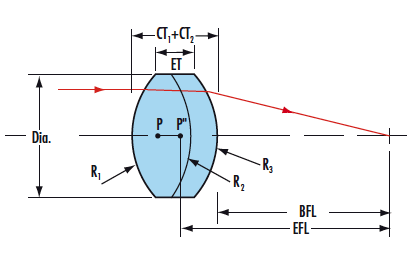
 TECHSPEC® 부품은 에드몬드 옵틱스가 설계, 사양 지정 및 제조하는 제품입니다. 더 알아보기
TECHSPEC® 부품은 에드몬드 옵틱스가 설계, 사양 지정 및 제조하는 제품입니다. 더 알아보기
| 가격(부가세 별도/Tax excluded) | |
|---|---|
| 수량 1-5 | KRW 162,843 개당 |
| 수량 6-25 | KRW 129,986 개당 |
| 수량 26-49 | KRW 122,467 개당 |
| 더 필요하신가요? | 견적 요청 |
해당 제품은 750 - 1100nm 파장 대역의 다색광(polychromatic light)으로 가장 작은 스폿 크기를 제공하도록 설계되었습니다. 가시광선을 사용하는 표준 이중 렌즈 대신 해당 제품을 사용하면 다색광으로 RMS 스폿 직경을 43μm에서 22.5μm로 줄일 수 있습니다. 흑백 조명으로 초점을 맞출 때는 스폿 크기가 더 작아집니다. 해당 제품은 구면 수차를 줄였으며 최대 2μm 파장의 흑백 조명과 함께 사용할 때 우수한 성능을 발휘합니다. 주요 어플리케이션으로는 NIR 이미징 렌즈, NIR 레이저 포커싱 및 확장, 광섬유 및 NIR LED 렌즈 포커싱/시준 등이 있습니다.

에드몬드옵틱스는 특정 어플리케이션 요건을 충족할 수 있는 광학 및 이미징 부품에 대한 포괄적인 맞춤형 제조 서비스를 제공합니다. 에드몬드옵틱스는 프로토타입 개발, 본격적인 생산 준비 단계 등 단계와 관계없이 고객의 니즈를 충족하는 유연한 솔루션을 제공합니다. 에드몬드옵틱스의 엔지니어는 전 개발 과정을 지원합니다.
에드몬드옵틱스의 제조 역량:
자세한 내용은 에드몬드옵틱스의 맞춤형 제조 역량 페이지를 확인하거나 여기로 문의 바랍니다.
본사 및 지사별 연락처 확인하기
견적 요청 도구
재고 번호 입력 필요
Copyright 2023, 에드몬드옵틱스코리아 사업자 등록번호: 110-81-74657 | 대표이사: 앙텍하우 | 통신판매업 신고번호: 제 2022-서울마포-0965호, 서울특별시 마포구 월드컵북로 21, 7층 (서교동, 풍성빌딩)
The FUTURE Depends On Optics®